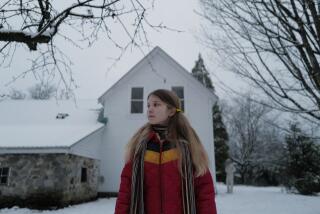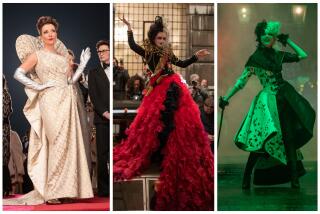Just who exactly is this guy?
AT noon, Hugo Weaving slid into the worst table for two in the Odeon, next to the wet coats, and ordered himself a three-egg omelet. He sported a massive beard, close to but far fuller than Trotsky’s, really more like Marx’s, though not white or quite as bushy. With his jeans and short-sleeve T-shirt over long-sleeve shirt, he looked like a naughty hippie-surfer daddy.
The beard also made his Agent Smith face invisible. That suits Weaving -- 46 in a few weeks -- who on film always is, and always wants to be, something slightly less present than a ghost.
In the “Matrix” trilogy, sometimes his body was not his but instead many CGI replicas of himself. And then he is sometimes alien: the elf with the thin eyebrows and the creepy ears in the “Lord of the Rings” films.
And now to these odd credits add that of the man who performed -- almost -- an entire film from behind a mask. “There is a face beneath this mask,” says Weaving’s character, V, the terrorist hero of “V for Vendetta,” currently in theaters, “but it is not me.”
Except that V, in addition to his allusions to being more idea than man, isn’t even always Weaving. Take that brisk brushing-off of a leather boot in the opening sequence. “You know, I came in to replace someone on the film,” Weaving said -- that was James Purefoy, who did a few weeks of shooting as V before being replaced by Weaving. “And actually that particular shot is not even me. There are a couple of the scenes at the beginning of the film that are James.”
Of course. Weaving’s always the man who was barely there.
And who would know, anyway? The character’s mask, of a grinning Guy Fawkes -- who was hanged in 1606 for his part in a plot to blow up Parliament -- completely obscures the face. “In a funny way the mask meant certain” -- a macchiato was delivered -- “It was a kind of liberator, in a way.” His V turns out to be both prissy and macho, hyper-verbal, an actor at heart.
“They were very quick and simple decisions that I made,” Weaving said of his performance. “And they weren’t very thoughtful” -- which he meant in the Buddhist/Method acting way. “Too many thoughts are a major barrier to being, to flow,” he said, and mocked himself with each hand in a peace sign.
The mask was miked, but in the end, his dialogue was looped, using both an open mike and a mike inside a mask. Post shooting dialogue changes were particularly hard: Every original breath and line had minutely moved the mask, and matching it all up after the fact proved a challenge. After the “Matrix” movies, though, Weaving is used to hard, long hours. In the case of V’s looping, he said with cheer, “not every scene was done a number of times.”
The role caused Weaving to rely on his theater training. A character is still a character when he is speaking over the phone, Mr. Weaving pointed out. The masked experience “sort of crystallized: What is a character? And if you are robbed of your face, well, what do you have? Or who are you?”
It was a Sunday, midway through a four-week run of “Hedda Gabler” at the Brooklyn Academy of Music. Weaving was staying in Lower Manhattan in Battery Park City. His wife had been with him but had returned home recently to reclaim their two children from friends.
Weaving has no staff, comparatively; an agent in London, Chris Andrews at ICM in Los Angeles, and a lead agent in Sydney, and then a lot of scraps of paper spread on his desk. He doesn’t so much think that he works in the American film world at all: “ ‘V’ was shot in London and Berlin. ‘Lord of the Rings’ I’ve always thought of as being a Kiwi film.”
He doesn’t even go to L.A. very much. He claimed to have not much in the way of upcoming commitments, perhaps a publicity junket to Japan.
Recently he has been reading Hemingway’s autobiographical stories of Paris. Weaving claims he cannot drive a car. He has a dairy farm three hours outside of Sydney, plagued (so far peaceably) with brown snakes and a beautiful diamond python that likes to winter in the roof. He is looking forward to planting trees there.
Brunch over, he would take “the Tube” to work for a 3 p.m. matinee. Just on the other side of the river, 40 minutes before curtain, Weaving was enjoying a leisurely smoke and a stroll. “A Thursday night audience here seems to be absolutely sharp as a tack,” Weaving had said; Saturday nights, audiences tended to be reserved or conservative. This Sunday’s matinee audience, it would turn out, was positively tubercular.
A cold was circulating among the cast as well -- Weaving said he was on Day 3 of his and that his voice was thin. In the matinee, his costar Cate Blanchett even coughed, exquisitely, onstage. While her Hedda Gabler tossed actors and flowers and guns about like Maria Callas on a Tilt-a-Whirl, Weaving as Judge Brack played his seduction and destruction steady and slow. The Sydney Theatre Company production is surprisingly funny -- “You have to earn the ending,” Blanchett said, grimly, later.
Through all his wool, Weaving’s face was still perfectly communicative onstage. During her solo curtain call and standing ovation, Blanchett laughed and cried a little, then turned back upstage and stomped her feet in a little impatient dance, grabbing the air for Weaving and the cast to join her.
At 6 p.m., Weaving walked the block over to BAM’s cinema; the day’s clouds were breaking, pink waited over Manhattan. Blanchett stood unnoticed in the back of a packed theater while the credits of a 2005 film in which they both work, “Little Fish,” rolled.
Afterward, they took the stage for a Q&A; session with the audience. Weaving’s voice had deepened and richened. His body was completely relaxed, as if he’d just done two-plus hours of yoga, not Ibsen. The Australians talked about the things smart actors talk about: energy production and “flow” and the difference between Australian and American film sets. In Australia, “Everyone mucks in,” said Blanchett. “I lift the odd light,” said Weaving.
Does he recognize himself on screen, someone wanted to know. “Yes, it’s you up there, but it’s not,” he said. He debated it with himself for a while. “I’ve gotten used to seeing both myself and not seeing myself,” he finally said.
In the lobby after, Blanchett and her young child and husband left quickly. But Weaving stayed to sign “Matrix” box sets, have pictures of himself taken with minuscule animal figures, and talk with folks at length. Two of the autograph collectors outside were miffed that Blanchett hadn’t signed their “Aviator” DVDs. They agreed, though, that Hugo Weaving was the coolest, mellowest big-name celebrity that they’d ever met. But was he, really? A celebrity?
“You’re certainly pushed into selling yourself as a commodity in order to sell the product,” Weaving had said earlier at the Odeon. “I will engage in the selling of the film. But I will try not to engage in the selling of the image, because I find that it’s easier to go on and make another film -- because the next character is actually obstructed if your image is bigger than it. So the longer you keep the mask on, metaphorically and physically, the better.”
More to Read
Only good movies
Get the Indie Focus newsletter, Mark Olsen's weekly guide to the world of cinema.
You may occasionally receive promotional content from the Los Angeles Times.









